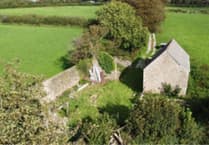A KINGSTEIGNTON farmer has admitted risking polluting the countryside by illegally dumping asbestos waste on his land for the second time.
Christopher Garrett pleaded guilty to two environmental offences relating to his land near Newton Abbot when he appeared at Exeter Crown Court.
Garrett, aged 63, of Little Lindridge Cottage, near Kingsteignton, admitted operating a regulated facility without a permit between July 19, 2018 and May 15, 2022.
He also pleaded guilty to treating or disposing of controlled waste in a manner likely to cause pollution by dumping waste containing asbestos between the same dates.
Judge Anna Richardson adjourned sentence until June 9 to allow time for an investigation under the Proceeds of Crime Act. She ordered a probation pre-sentence report.
She told Garrett: ‘I am not making any promises about the outcome of the case but so the court can have as much information as possible about this offending and what lay behind it.’
Mr David Sapiecha, defending, said he hopes to obtain information from Garrett’s GP about treatment he had been receiving for anxiety and depression.
Garrett was jailed for four months, suspended for two years, after he admitted allowing the disposal of controlled waste without a permit in 2016.
He also ordered him to pay £3,221.78 costs to the Environment Agency (EA) and remove all the waste at his own expense within a year.
That case arose because neighbours living close to his farm, which is between Kingsteignton and Teignmouth, complained about the number of builders’ trucks using the narrow lanes that led to it.
Environment Agency inspectors issued an official warning in June 2014 but Garrett ignored it and allowed even more waste to be dumped over the next 13 months until he was raided for a second time.
Garrett had created a hard standing out of buried waste at the top of a hill and carried out illegal burning of building materials including plastics on it.
Other building waste had cascaded down a hill like an avalanche and engulfed trees in a copse at the bottom.
A path had been built down the hill which was found to include potentially lethal broken asbestos tiles.
Recorder Mr Paul Dunkels, KC, sentencing in the earlier case, told Garrett: ‘This was a deliberate course of conduct. The case is significant.
‘It goes without saying that if there was a further offence of unlawful dumping there would be immediate imprisonment. It must stop.’




